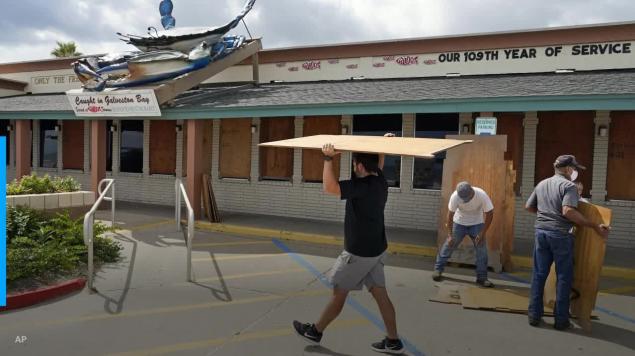We will be experiencing more and more ....summers seem to be getting longer .....and hotter ....and hurricanes seem to be getting more intense ........it'a the new normal thanks to us ......oh!!!!! and china of course ....well we blame them for everything ....so throw that in the mix ....they don't care ..........but it's us .....we will not be happy until there is nothing left .....we are destroying the rain forests ,...polluting rivers using up resources ......etc ......etc .....so we reap what we sow .....and we sow some sinister seeds .....our food basket is shrinking badly .....every year we lose millions of acres in land for growing crops....... and what do we do breed like fucking horseflies ...polluting using more resources ....only when the last animal is killed and there is nothing to eat will the stupid bi-ped realize he is cunt through greed ......look at the the palm oil industry they de-forest just to grow palm oil .......mining for diamonds a product wiyj no value yet human beings pay thousands for carbon ....stupidity .......its the demise ....but they do not see future ........still its always the seem bolting the gate after the horse has escaped ....its the demise of the human race ......simple ......
Laura blasts Gulf Coast with wind, rain and wall of seawater
LAKE ARTHUR, La. (AP) — Hurricane Laura pounded the Gulf Coast with ferocious wind and torrential rain and unleashed a wall of seawater that could push 40 miles inland as the Category 4 storm roared ashore Thursday in Louisiana near the Texas border.
Laura battered a tall building in Lake Charles, blowing out windows as glass and debris flew to the ground. Police spotted a floating casino that came unmoored and hit a bridge. But hours after the hurricane made landfall, the wind and rain were still blowing too hard for authorities to check for survivors.
Hundreds of thousands of people were ordered to evacuate ahead of the hurricane, but not everyone fled from the area, which was devastated by Hurricane Rita in 2005.
“There are some people still in town, and people are calling ... but there ain’t no way to get to them,” Tony Guillory, president of the Calcasieu Parish Police Jury, said over the phone from a Lake Charles government building that was shaking from the storm.
Guillory said he hoped the stranded people could be rescued later in the day, but he feared that blocked roads, downed power lines and floodwaters could get in the way.
“We know anyone that stayed that close to the coast, we’ve got to pray for them, because looking at the storm surge, there would be little chance of survival,” Louisiana Lt. Gov. Billy Nungesser told ABC’s Good Morning America.
With nearly 470,000 homes and businesses without power in the two states, near-constant lightning provided the only light for some.
The National Hurricane Center said Laura slammed the coast with winds of 150 mph (241 kph) at 1 a.m. CDT near Cameron, a 400-person community about 30 miles (48 kilometers) east of the Texas border. Forecasters had warned that the storm surge would be “unsurvivable” and the damage “catastrophic.”
They predicted a storm surge of 15 to 20 feet in Port Arthur, Texas, and a stretch of Louisiana including Lake Charles, a city of 80,000 people on Lake Calcasieu.
"This surge could penetrate up to 40 miles inland from the immediate coastline, and floodwaters will not fully recede for several days," the hurricane center said.
Hours after it arrived, Laura remained a Category 2 hurricane, with sustained winds of 100 mph (160 kph). Its center was moving north, about 20 miles (30 kilometers) north of Fort Polk, Louisiana. Damaging winds extended outward as far as 175 miles (280 kilometers).
Dick Gremillion, the emergency director in Calcasieu Parish, said authorities were unable to get out to assess damage.
"The wind is still over 50 mph. It’s going to have to drop significantly before they can even run any emergency calls. We also need daylight,” Gremillion said in an interview with Lake Charles television station KPLC.
More than 580,000 coastal residents were ordered to join the largest evacuation since the coronavirus pandemic began and many did, filling hotels and sleeping in cars since officials did not want to open large shelters that could invite more spread of COVID-19.
But in Cameron Parish, where Laura came ashore, Nungesser said 50 to 150 people refused pleas to leave and planned to endure the storm, some in elevated homes and even recreational vehicles. The result could be deadly.
“It’s a very sad situation,” said Ashley Buller, assistant director of emergency preparedness. “We did everything we could to encourage them to leave.”
Becky Clements, 56, did not take chances. She evacuated from Lake Charles after hearing that it could take a direct hit. With memories of Rita's destruction almost 15 years ago, she and her family found an Airbnb hundreds of miles inland.
“The devastation afterward in our town and that whole corner of the state was just awful,” Clements recalled. “Whole communities were washed away, never to exist again.”
Federal Emergency Management Agency Administrator Pete Gaynor urged people in Laura's path to stay home, if that's still safe. “Don't go out sightseeing. You put yourself, your family at risk, and you put first responders at risk," he told “CBS This Morning.”
FEMA has plenty of resources staged to help survivors, Gaynor said. Louisiana Gov. John Bel Edwards mobilized the National Guard to help, and state Department of Wildlife crews had boats prepared for water rescues.
Forecasters expected a weakened Laura to cause widespread flash flooding in states far from the coast. An unusual tropical storm warning was issued as far north as Little Rock, where forecasters expected gusts of 50 mph (80 kph) and a deluge of rain through Friday. The storm was so powerful that it could regain strength after turning east and reaching the Atlantic Ocean, potentially threatening the densely populated Northeast.
Laura hit the U.S. after killing nearly two dozen people on the island of Hispaniola, including 20 in Haiti and three in the Dominican Republic, where it knocked out power and caused intense flooding.
It was the seventh named storm to strike the U.S. this year, setting a new record for U.S. landfalls by the end of August. The old record was six in 1886 and 1916, according to Colorado State University hurricane researcher Phil Klotzbach.
___
Deslatte reported from Baton Rouge, Louisiana, and Plaisance from Stephensville, Louisiana. Associated Press contributors include Jeff Martin in Marietta, Georgia; John L. Mone in Port Arthur, Texas; Paul J. Weber in Austin, Texas; Seth Borenstein in Kensington, Maryland; Juan A. Lozano in Houston; Jake Bleiberg in Dallas; Jay Reeves in Birmingham, Alabama; Jill Bleed in Little Rock, Arkansas; and Sophia Tulp in Atlanta.



No comments:
Post a Comment